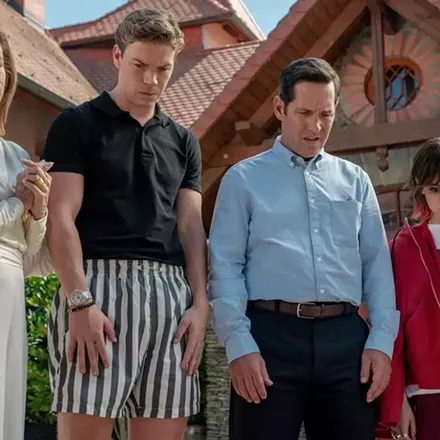Public Enemies
The Ice Mann Cometh: Public Enemies showcases its director’s skills—but does it have a warm heart?
By Scott Renshaw @scottrenshawMichael Mann deserves major gratitude
from me for one thing above
all else: Thanks to him, I finally
understand what apparently frustrated so
many people about Stanley Kubrick.
Frankly, I’ve never grasped the cult of
Mann over the years. Though his creation
of the iconic Miami Vice TV series tended
to define him for a decade, it’s not that he
struck me as a quintessential style-over-substance
guy as he started making earthy
dramas like Heat and Collateral. I could
recognize his facility as a cinematic craftsman
and his knack for editing together
masterfully tense scenes. But his movies
never connected with me emotionally.
What Kubrick’s detractors saw in the 2001:
A Space Odyssey director, I saw in Michael
Mann, even in something as ostensibly
“romantic” as The Last of the Mohicans: He
was all in his head, and never in his heart.
Mann’s new film, Public Enemies, seems
on its surface to be an attempt to take
things in that more-emotional direction.
Sure, he’s telling a story about criminals,
specifically the period in 1933-34 when John
Dillinger (Johnny Depp) had captured the
public imagination as a Robin Hood-type
bank robber who never stole from individuals.
Mann and his co-screenwriters, Ann
Biderman and Ronan Bennett—working
from Bryan Burrough’s nonfiction book—also follow federal agent Melvin Purvis
(Christian Bale) as his crime-fighting efforts
earn the favor of J. Edgar Hoover (an almost
unrecognizable Billy Crudup) and land him
the task of tracking down Dillinger.
But there’s also, in theory, a love story at the core of Public Enemies. Dillinger launches a whirlwind courtship of coat-check girl Billie Frechette (Marion Cotillard), if, in fact, “courtship” is the proper word to describe Dillinger’s no-nonsense way of telling a girl, “You’re with me now.” The two become lovers and on-the-lam traveling companions, at times separated by incarceration or law-enforcement observation but forever devoted to one another (the odd visit to a prostitute by Dillinger aside).
At least, that’s what we’re supposed to
feel. Mann, however, crafts “intimate” scenes
that only brush the surface of his characters.
What draws Billie to Dillinger beyond his
bad-boy appeal? Is Dillinger’s fascination
with Billie connected to the photo he keeps
in his pocket watch, perhaps of his mother?
And, if so, isn’t that more creepy than romantic?
Depp does a terrific job of creating a
Dillinger who’s all business when it comes
to his heists, yet also takes pleasure in his
celebrity and in making law enforcement
look foolish. His sensitive side, however, isn’t
high on Mann’s list of priorities.
It’s impressive, then, that Public Enemies remains so consistently engrossing almost entirely on the basis of individual sequences. Terrific set pieces make Mann’s 140 minutes feel like it’s flying by: a botched stakeout at an apartment suspected of being Dillinger’s hideout; a guns-blazing bank job teaming Dillinger with the crazed “Baby Face” Nelson (Stephen Graham), a stark contrast to Dillinger’s preferred style; an FBI siege at the gang’s rural Wisconsin hideout; even Dillinger walking incognito through the police office filled with lawmen devoted to his capture. Mann understands the timing and the geography of action sequences as well as any filmmaker working, leading to an almost constant state of tension. Indeed, there’s a lot of background context here beyond the shootouts and chases that adds to the experience. Bale has a somewhat thankless role, but he’s effective at conveying the pressure felt by the guy who needed to make the FBI look indispensable as Hoover attempts to consolidate his power. There’s some interesting stuff about Chicago’s freshly minted crime syndicates turning against Dillinger for bringing too much high-profile attention to interstate lawbreaking. Mann can even make it fascinating watching guys plan to commit a robbery.
There’s just that one nagging little detail:
Do we really care? The climatic FBI stakeout
at the movie theater where Dillinger famously
(Historical Spoiler Alert!) meets his end is
another great sequence, built on Dillinger
enjoying a gangster flick that seems to validate
his approach to life. Maybe I should feel
sympathetic as the last few minutes unfold;
maybe I should wonder about the message
Dillinger wants to pass on to Billie. My head
tells me I’m watching a great director at
work—and that there was also the potential
for something with less of a chilly heart.
PUBLIC ENEMIES
Johnny Depp, Christian Bale, Marion Cotillard
Rated R
Speaking of...
-
Knight and Day
Clear on the Concept: Knight and Day’s premise may be familiar, but its many goofy charms aren’t.
- Jun 23, 2010
-
Robin Hood
We Wuz Robbed: Ridley Scott’s Robin Hood can’t deliver promise of a story behind the legend.
- May 12, 2010
-
Iron Man 2
Stark Contrast: Iron Man 2 leaves you wanting more of the guy who made the original fly.
- May 6, 2010
- More »
More by Scott Renshaw
-
Boulder Weekly Film Critic Talks About Sundance Move to Colorado
Discussing the logistics, finances and politics of the festival's relocation
- Apr 3, 2025
-
Film Reviews: New Releases for April 4
A Minecraft Movie, The Friend, Hell of a Summer, Bob Trevino Likes It, Freaky Tales
- Apr 3, 2025
-
April David Lynch Film Festival at Broadway Centre Cinemas
The Elephant Man, Eraserhead, Mulholland Dr., Blue Velvet and more to celebrate the late director.
- Apr 2, 2025
- More »
Latest in Film Reviews
Readers also liked…
-
Sundance 2025 wrap-up plus February special screenings
Uncertainty about the future location shifts focus away from the movies
- Feb 5, 2025








